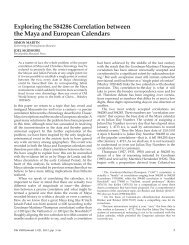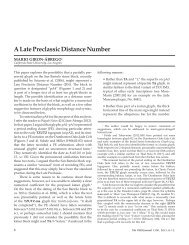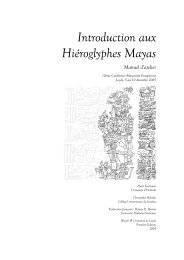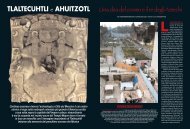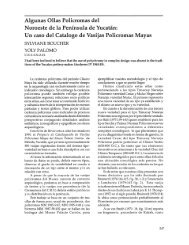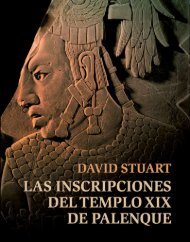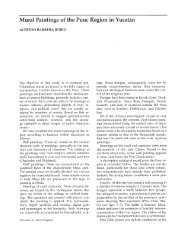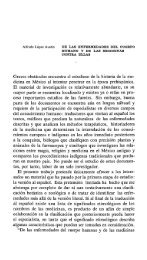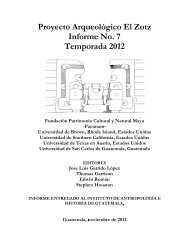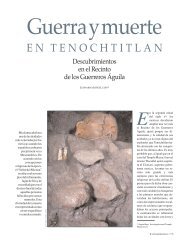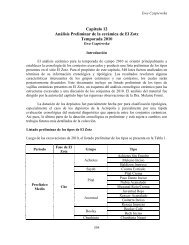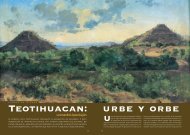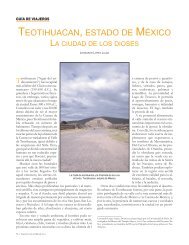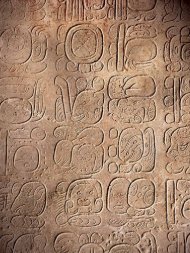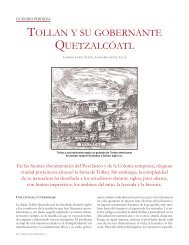Popol Vuh: Sacred Book of the Quiché Maya - Mesoweb
Popol Vuh: Sacred Book of the Quiché Maya - Mesoweb
Popol Vuh: Sacred Book of the Quiché Maya - Mesoweb
Create successful ePaper yourself
Turn your PDF publications into a flip-book with our unique Google optimized e-Paper software.
oom and give <strong>the</strong>m a living voice. Such power must be approached with great seriousness,<br />
and all care taken to be faithful to <strong>the</strong>ir original ideas in any transcription or translation. At<br />
<strong>the</strong> end <strong>of</strong> our work sessions, he politely dismissed <strong>the</strong> gods and ancestors involved in that<br />
day’s reading with his thanks and asked pardon for any <strong>of</strong>fense we might have given.<br />
Most <strong>of</strong> <strong>the</strong> people who lived on <strong>the</strong> American continents prior to <strong>the</strong> arrival <strong>of</strong><br />
Europeans lacked a written script. Even in Mesoamerica, where <strong>the</strong>re was a long tradition <strong>of</strong><br />
hieroglyphic writing among some <strong>of</strong> <strong>the</strong> ancient cultures <strong>of</strong> <strong>the</strong> region, such as <strong>the</strong> <strong>Maya</strong> and<br />
Zapotecs, o<strong>the</strong>r neighboring cultures preserved <strong>the</strong>ir history and <strong>the</strong>ology principally through<br />
<strong>the</strong> spoken word, passed from generation to generation. This was true even <strong>of</strong> highly<br />
sophisticated cultures such as <strong>the</strong> Aztecs, whose painted texts relied primarily on a rebus or<br />
picture form <strong>of</strong> writing incapable <strong>of</strong> recording abstract ideas phonetically. Yet <strong>the</strong> concept <strong>of</strong><br />
oral poetry held by <strong>the</strong> Aztecs is exemplary <strong>of</strong> <strong>the</strong> view <strong>of</strong> such discourse throughout<br />
Mesoamerica, including <strong>the</strong> <strong>Maya</strong>.<br />
For <strong>the</strong> ancient Aztecs <strong>the</strong> highest form <strong>of</strong> sacred communication was poetry, what <strong>the</strong>y<br />
called xochicuicatl (“flower-song”). These were delicately beautiful hymns meant to be recited<br />
orally, <strong>of</strong>ten to musical accompaniment. In paintings, Aztec poets are depicted with speech<br />
scrolls issuing from <strong>the</strong>ir mouths. These scrolls are <strong>of</strong>ten colored a rich blue or green,<br />
symbolic <strong>of</strong> <strong>the</strong> precious nature <strong>of</strong> <strong>the</strong> poets’ words as if <strong>the</strong>y were composed <strong>of</strong> jade or<br />
sacred quetzal fea<strong>the</strong>rs. Aztecs looked upon poetry as <strong>the</strong> actualization <strong>of</strong> a creative act<br />
inspired by divinites who were called upon to be present at <strong>the</strong> performance. Thus <strong>the</strong> poet<br />
Ayocuan Cuetzpaltzin <strong>of</strong> Tecamachalco believed that his songs came from heaven, but<br />
lamented that his own words could not express <strong>the</strong>m as <strong>the</strong>y came undefiled from <strong>the</strong> gods:<br />
From within <strong>the</strong> heavens <strong>the</strong>y come,<br />
The beautiful flowers, <strong>the</strong> beautiful songs.<br />
Our longing spoils <strong>the</strong>m,<br />
Our inventiveness makes <strong>the</strong>m lose <strong>the</strong>ir fragrance. (León-Portilla 1980, 257)<br />
Such songs exist only at <strong>the</strong> moment <strong>of</strong> <strong>the</strong>ir performance, <strong>the</strong>ir sound hanging briefly in<br />
<strong>the</strong> air, <strong>the</strong>n fading to silence. It is only when <strong>the</strong>y are spoken that <strong>the</strong>y reveal <strong>the</strong>ir divine<br />
8



